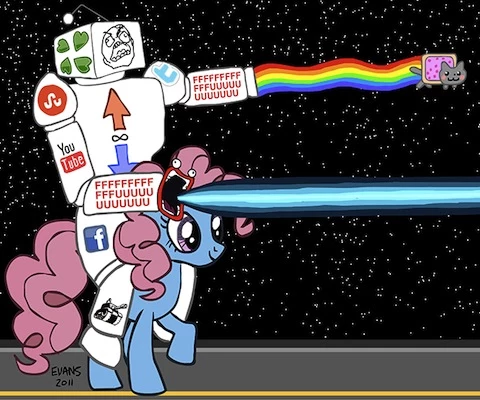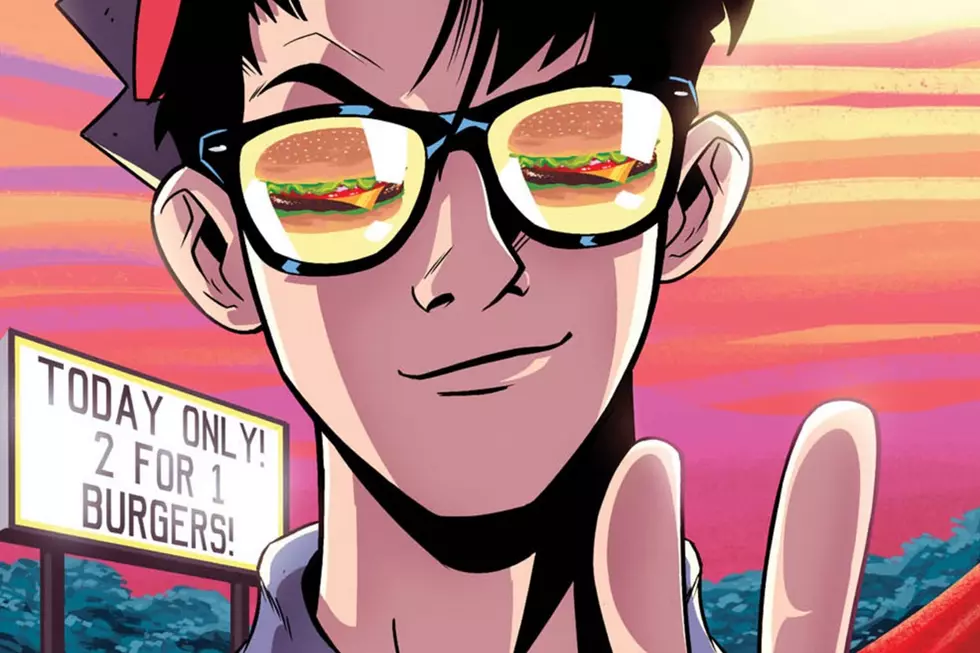![The Dangers of SOPA, The Stop Online Piracy Act, to Comic Books and You [Op-Ed]](http://townsquare.media/site/622/files/2012/01/getyourwaronsopa-1326396955.jpg?w=980&q=75)
The Dangers of SOPA, The Stop Online Piracy Act, to Comic Books and You [Op-Ed]

If you spend any amount of time on the Internet that doesn't involve asking someone younger why you can't get Google to work, then you've probably seen a united and unprecedented team of companies and creative professionals -- including ComicsAlliance's parent company AOL -- coming out against the proposed legislation referred to as SOPA, the Stop Online Piracy Act.
The debate over the bill has caused Get Your War On creator David Rees to start a new webcomic, seen above, called Get Your Censor On. Popular aggregate site Reddit is going dark on January 18 to protest the bill, as is Wikipedia. The video game industry is split over the issue, although most major corporations seem to still be supporting the underlying notions of SOPA.
As both fans who love the comics and critics who believe that the open exchange of art and ideas is essential to the vitality of the medium and its distribution, here's why we think proposed laws like SOPA are damning to both comic books and the creative industry generally, and why there has been such a conflicting response -- or lack of one -- from comics publishers.SOPA came to the forefront on the comics blogosphere recently when Marvel Entertainment and its parent company Walt Disney, along with DC Comics owner Time Warner, were named on a list of SOPA supporters released by congress and publicized online. Seeing the ostensible support of the bill from the two biggest publishers in comics prompted a variety of responses within the comics community, including some pointedly negative ones from creators like Steve Niles.
The internet has become an essential tool for the distribution of comic books and discussion about them. Fans and pros alike promote both individual comics and the medium itself by creating and sharing art on forums, websites, and social networks, practices that are directly imperiled by these laws. ComicsAlliance is officially against such destructive legislation.
If you're unfamiliar with the bill introduced by 65-year-old Texas Representative Lamar Smith, the premise is that the legislation will hinder the loss of revenue from copyright content being shared online, and ultimately save entertainment industry jobs (although conservative think-tank Cato Institute says such claims are false).
Here's a quick crash-course from ReadWriteWeb on the issue and what it would require:
1) Make internet service providers block access to domain name system services from foreign sites that are seen as infringing copyright. For example, a Comcast customer typing ThePirateBay.org into their browser wouldn't be able to find the website. Two Dutch cable companies have already started doing something similar.
Why it's dumb: Many people have speculated that this is a thinly-veiled attempt to stop Americans from getting to sites like ThePirateBay.org, which exist outside US laws. It's similar to the infamous "Firewall of China" that we associate with restricting basic freedoms. Also, under the language of the proposed legislation, only the domain name would be blocked; all a user would need to do would be to call up the actual IP of a website. Oh look, here's an entire list of those IPs in case our government decides to do something so completely stupid.
Plus, the language of the proposed legislation suggests that a single instance of copyright infringement could take down an entire site, instead of requiring the site to simply remove the content that's in violation of the law. Finally, and this shows the complexity of bills - and perhaps the downright ignorance of our elected officials - sites with .com or .org that are registered in the US would not be subject to certain provisions in the bill.
2) Make search providers remove infringing sites from their service, making them undiscoverable.
Why it's dumb: Not only would companies like Google have to constantly tailor their finely-tuned algorithms at the whim of government complaints, it doesn't actual solve what politicians are saying is the root of the problem: piracy of entertainment content. As noted above, it wouldn't be long before everyone simply memorized the IP of their favorite download site like it was the phone number of a high school crush in 1995. It would only be a matter of time before additional laws would need to be created in order for online companies to comply with blocking websites.

3) Make payment services stop processing money to infringing sites.
Why it's dumb: If you're a product manufacturer, especially a creative novice, selling items online can be your primary source of income, and if only one of your products is a little too close for comfort to a copyright holder, your entire business can be put on hold. Good luck paying those bills!
We've seen places like PayPal, Visa and Mastercard, and others pull their services from efforts to support Wikileaks, but under SOPA, this sort of economic shutout could happen on a grand scale. There are horror stories aplenty about PayPal holding funds for small business owners. Imagine that headache multiplied a thousandfold.
4) Make advertisers cease associating and doing business with infringing sites.
Why it's dumb: Like the equally foreseeable second point described above, this will require companies like Google to change their technology in drastic ways, making the process of selling and distributing advertising online potentially more complicated than it is already. Plus, it could ban artists and companies who are fine with their material being on so-called infringing sites from having their work promoted to a wider audience.

Not everyone may think the above proposals are all that damning, but technology and legal experts certainly do. Late last year, Harvard Constitutional Law professor Lawrence Tribe called SOPA "The end of the Internet as we know it." As Congress plans to start session again on January 17, the same day a major protest stemming from the Occupy Wall Street movement is set to descend on the capital, there might not be much time left to stop what many see as an ignorant and harmful piece of legislation.
Thankfully some technology professionals are finally being called to testify about why SOPA and bills like it will damage the evolution of the internet. But giant entertainment companies have been pouring millions of dollars into the pockets of politicians in Washington to try and pass the bills.
Much like the NDAA recently signed by President Obama, we're told from lawmakers and giant conglomerates that stringent regulations and expansive powers will not affect ordinary Americans going about their business. But with so much money clearly going to politicians from a very specific group of people with very specific goals, why should be believe the government or their lobbyists? Especially when organizations like the RIAA sued tens of thousands of people for thousands of dollars over the course of five years before deciding that going after the common person was a poor idea.

Would Dan Hipp get to continue with his incredibly stylized take on a range of licensed characters, like the one seen above? What about parody webcomics like Let's Be Friends Again and The Gutters?
For now, the internet is still a relatively wide-open playing field, and as such there are some fairly clever ways to help educate and engage users, like a Google Chrome extension that will tell you if you're visiting a SOPA supporting website. If you have the time, read BoingBoing's Guide to Defeating Censorware that was created after the site was banned from the UAE in 2006 for more examples.
Comics have had a long history of censorship problems and, for the most part, have had a proud tradition of standing up for individual rights. Perhaps its because these most recent laws specifically target the internet that the industry has yet to respond in a unified voice. It's no secret that some publishers and retailers see the web as a potential threat to their self-perpetuating market place.
We've noted that Steve Niles was quick to become a public and vocal opponent of SOPA, and recently Fantagraphics President Gary Groth released the following statement:
"We are opposed to SOPA on the grounds that it gives the state too much unilateral authority to censor or exercise its power so that the result is effectively censorship once removed. It doesn't provide sufficient safeguards to mitigate our concern over potential harm to free speech. Fantagraphics Books has been traditionally a proponent of 1st Amendment rights - we have vigorously fought four private lawsuits that have attempted to violate those rights - and although we also believe in intellectual property rights, we believe this bill is deleterious to the former and too draconian for the latter."


ComicsAlliance reached out to other publishers, and found Oni Press was also taking a position against the bill, with a representative stating:
"Though we believe that protecting the comics published by Oni Press is necessary we are also a creator owned company, and the current bills being discussed have too many unintended consequences that would directly affect our creators rights for us to be comfortable with them in their current form . . . Passing laws trying to constrain the use of these new technologies isn't adequate or realistic . . . We would hope that a way can be found to stop the illegal distribution and profiting from such distribution of works without crippling the free flow of legitimate information and content on the Internet."
When reached for comment, DC, Marvel, IDW and Image had an official statement of "no comment" or did not response to requests, while DC parent company Warner Bros. oddly directed us to contact the fiercely pro-SOPA Motion Picture Association of America (MPAA) for further information.
As someone who has worked in the industry as a former Marketing Coordinator for Dark Horse Comics, I've noted that piracy is a huge concern for publishers, and I've also argued for open-source sharing platforms to encourage a growth in readership. Considering that some people recently called for a boycott of Dark Horse products over something as small as a digital pricing gaffe, a far larger number should be concerned over measures that could threaten the vitality of a growing marketplace and the very scope of creative expression.

I understand that for every 4Chan/Underground success story there are creators who have lost potential income because someone decided to freely download their art instead of purchasing it and supporting their craft. But I think it's fairly obvious that measures like SOPA are overkill, and will do far more harm than they will good. With comic sites like The Beat, Bleeding Cool, Comic Book Resources, and more (see the full list being compiled by GraphicPolicy) voicing their opposition, it would be nice to see more than a few publishers and creators come out against SOPA as well, and soon.
You can do your part by contacting your representative and letting them know how you feel on the issue. Believe it or not, it seems to be working and could trigger a Presidential veto (although that veto could be overruled by Congress). Also know that a very similar piece of legislation called the Protect IP Act (PIPA) is up for vote in Senate as introduced by Vermont Senator and Democrat Patrick Leahy. These issues are not about being a Republican or Democrat; they are about the basic governing laws of a new distribution and communication tool humanity has only begun to explore, and they concern us all.
More From ComicsAlliance









